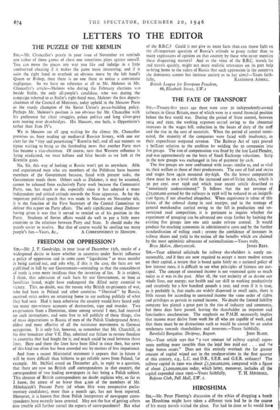LETTERS TO THE EDITOR
THE PUZZLE OF THE KREMLIN
SIR,—Mr. Chancellor's puzzle in your issue of November 1st reminds one rather of those games of chess one sometimes plays against oneself. You can move the pieces any way you like and indulge in a little unobserved cheating if it makes the game more interesting, and if it suits the right hand to overlook an obvious move by the left hand's Queen or Bishop, then there is no one there to notice a convenient negligence. So we have no reference at all to Mr. Molotov in Mr. Chancellor's article—Molotov who during the February elections was beside Stalin, the only all-people's candidate, who was during the campaign referred to as Stalin's right-hand man, Molotov the first deputy- chairman of the Council of Ministers, today upheld in the Moscow Press as the sturdy champion of the Soviet Union's peace-building policy. Perhaps Mr. Molotov's position is too obvious for Mr. Chancellor with his preference for silent struggles, palace politics and long silver-grey cars roaring over drawbridges. His Moscow, one feels, is Oppenheim's rather than Ivan IV's.
We in Moscow are all agog waiting for the climax Mr. Chancellor promises us, busy reading up mediaeval Russian history, with one ear alert for the " tiny and penetrating " Kremlin bell, and all our runners on tiptoe waiting to bring us the foreboding news that another Party man has become a vice-chairman. Of course, now that Western influence is being eradicated, we wear kaftans and false beards as we lurk at the Kremlin gates.
No, Sir, this way of looking at Russia won't get us anywhere. Able and experienced men who are members of the Politburo have become members of the Government because, faced with present tasks, the Government needs them. Others such as Zhdanov, it may be assumed, cannot be released from exclusively Party work because the Communist Party, too, has much to do, especially since it has adopted a more independent and critical attitude towards the State apparatus. As for the important political speech that was made in Moscow on November 6th, it is the function of the First Secretary of the Central Committee to deliver this report on Party affairs. The only significance about Zhdanov having given it was that it served to remind us of his position in the Party. Students of Soviet affairs would do well to pay a little more attention to the relations between Party and State. It should make the puzzle easier to resolve. But that of course would be spoiling too many


































 Previous page
Previous page